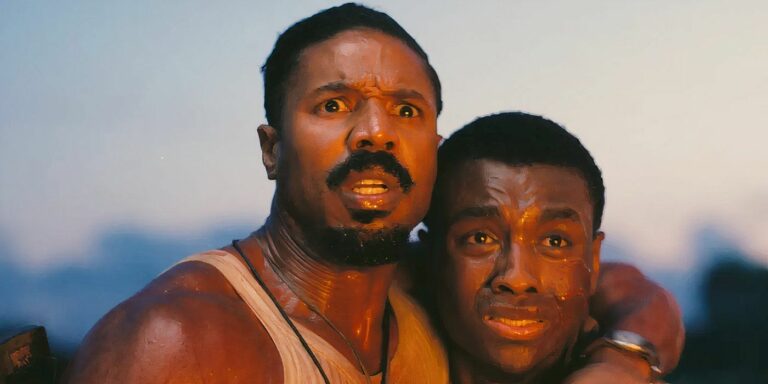It would be a sin to miss the excellent Sinners
Mike Finnerty 16 Apr 2025
At the end of The Brutalist’s epic 3 and a half hour run time, the journey of Lazlo Toth is punctuated with an Italo Disco song which prominently features the lyrics “one for you, one for me.”
Brady Corbet’s choice to end his epic film about the immigrant experience with a statement about the studio-director relationship in the film industry was a shrewd move to remind people that commerce and art will always have an uneasy relationship.
In the film world, “one for you, one for me” is the system that has kept Hollywood afloat since Steven Spielberg rewrote the rulebook with Jaws 50 years ago; a director has to do a commercial studio job, and in return, they get free rein with their next project.
Ryan Coogler has been one of the best examples of this paradigm in Hollywood over the last decade; after breaking out with the 2013 police brutality drama Fruitvale Station, Coogler was tapped to direct Creed, a film that made the Rocky franchise fresh and relevant again after years as a cultural punchline.
Coogler achieved the impossible in 2018 with the release of Black Panther – he made a superhero movie that was both deeply personal and still worked within the confines of the Hollywood studio system.
In the process, it became a defining cultural event and marked the peak of the Marvel project from a pure filmmaking standpoint.
2022’s follow-up Wakanda Forever had the unenviable task of trying to follow up a landmark film like Black Panther, function as a tribute to leading man Chadwick Boseman, and do the typical Marvel set-up yeoman’s work.
All of this context is necessary to understand why Sinners is so radical.
With Sinners, Coogler has made a film that is deeply personal to him, and it feels like he was given total carte blanche to do whatever he wants.
Sinners sees Coogler and his leading man Michael B Jordan reunite with the pair finding success together with Fruitvale Station, the Creed movies and Black Panther.
Much like how Martin Scorsese and Robert De Niro have defined modern cinema with their partnership, it has become clear that we are seeing the next generation.
Jordan stars as twin brothers, Smoke and Stack, in 1930s Mississippi.
The first half of Sinners deals with the brothers establishing themselves as the big cheeses in a small town on the Delta, and they are looking to branch out into running a bar.
The second half of Sinners is a vampire movie where the characters have to face off against a bloodthirsty horde.
We didn’t leave out six paragraphs; that’s literally how the film is structured.
What makes Sinners so radical is how Coogler tells two disparate stories – one a story about Prohibition-era gangsters in the Deep South and one a story about an evil vampire horde – and has the current of identity running through it.
Between the Black Panther movies, Coogler received his first Oscar nomination for producing Judas And The Black Messiah, a film which told the story of the real life Black Panthers in the 1960s.
Black Panther became such a cultural sensation and transcended language barriers because it was so focused on identity, and what that conceit means in the modern era.
Sinners has this identity sub-text running through its veins, so whether the film is in Scorsese gangster movie mode or Craven gorefest mode, it’s always present.
Coogler has a masterful control over tone and plotting in a way that most films simply don’t have.
The first half of the film being entirely dedicated to set-up means that all the players are on the pitch for the second half, when the action kicks in and you are fully invested in wanting to see how the story ends.
Jordan is the other half of the equation, and good news for fans of the actor – there are now two of him!
Twin roles are always a joy when done right (Jeremy Irons in Dead Ringers, Nicolas Cage in Adaptation, more recently, Robert Pattinson in Mickey 17), and Sinners gives Jordan the chance to really strut his stuff.
Jordan, remarkably, has never been nominated for an Oscar (hindsight shows he should have been nominated for the first Creed film, with apologies to Bryan Cranston in Trumbo and no apologies to Eddie Redmayne in The Danish Girl), and we are fully serious when we say he should be in contention this year.
Jordan plays both Smoke and Stack with distinguishing features – one is oil and one is water – and makes both characters their own.
A great supporting cast includes Hailee Steinfeld, finally finding a project worthy of the talent she showed in True Grit all those years ago, Jack O’Connell figuring out his calling is a weird character actor instead of a leading man, and the always fantastic Delroy Lindo
However, the biggest star of Sinners is someone you only ever hear – composer Ludwig Göransson.
The Swede was a big part of why Black Panther dominated the world in 2018, and his Oppenheimer score turned an already-fantastic movie into a legendary one.
Göransson takes full advantage of the movie being set in 1930s Mississippi, juxtaposing the Delta blues with more modern elements such as electronics.
Hearing bluesy guitars fight for attention with more traditional orchestral elements on the score creates a unique tension that the film really takes advantage of.
Someone more qualified to talk about music will be able to tell you why the score is so incredible, but a film person can tell you that the music is a character in this movie.
2025 has been pretty hit and miss as far as film goes – the big successes have been on television thanks to shows like Adolescence, Severance and The White Lotus – but Sinners is the first film this year which commands your rapt attention.
Films like Sinners are the ones that make you sit up in your seat and elbow your seatmate to say, “bloody hell, this is special.”
Sinners is a true original and a filmmaker like Coogler operating at the top of their game – make sure to vote with your wallets and tell the studios this is what we want to see more of.











